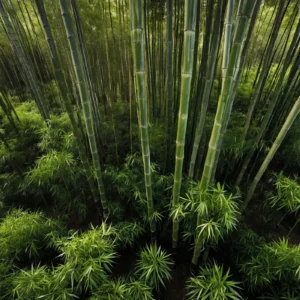The world is grappling with the pressing issue of climate change. As the impacts of global warming become increasingly evident, the need for sustainable solutions has never been more critical. One such solution lies in the cultivation of bamboo, a remarkable plant often hailed as “green gold.” This blog post delves into the myriad benefits of bamboo plantations, exploring how they can contribute to mitigating climate change, bolstering economic growth, and preserving our planet for future generations.
Bamboo: Nature’s Climate Change Champion
Bamboo, a fast-growing grass, possesses exceptional qualities that make it a formidable ally in the fight against climate change. Its rapid growth rate is unparalleled, with some species capable of reaching maturity within a few months. This rapid growth translates into an extraordinary carbon sequestration capacity. Bamboo absorbs carbon dioxide from the atmosphere at a significantly higher rate than many trees, helping to reduce greenhouse gas emissions.
Beyond carbon sequestration, bamboo plays a crucial role in soil conservation. Its extensive root system binds the soil together, preventing erosion and preserving precious topsoil. This is particularly important in regions prone to deforestation and landslides, where bamboo can help stabilize vulnerable ecosystems. Additionally, bamboo plantations contribute to water conservation by reducing runoff and improving water infiltration.
A Versatile Resource with Endless Possibilities
Bamboo’s versatility is another key factor driving its potential as a sustainable solution. It is a renewable resource that can be used in a wide range of applications, from construction and furniture to textiles and paper. By substituting traditional materials with bamboo, we can reduce our reliance on non-renewable resources and minimize environmental impact.
One of the most promising applications of bamboo lies in the construction industry. Bamboo-based building materials offer a sustainable and cost-effective alternative to conventional materials such as steel and concrete. Bamboo structures are known for their strength, durability, and earthquake resistance. Moreover, the production of bamboo building materials generates fewer greenhouse gas emissions compared to traditional construction methods.
Another area where bamboo is making a significant impact is in the fight against plastic pollution. Bamboo-based products, such as biodegradable cutlery, straws, and packaging, offer eco-friendly alternatives to single-use plastics. By reducing plastic consumption, we can help protect marine life and reduce the amount of plastic waste ending up in landfills.
Economic Opportunities and Social Impact
The cultivation of bamboo can also generate substantial economic benefits. Bamboo plantations can create employment opportunities in rural areas, providing livelihoods for local communities. The development of bamboo-based industries can stimulate economic growth and reduce poverty. Furthermore, bamboo farming can empower women and marginalized groups, promoting gender equality and social inclusion.
Challenges and Opportunities
While bamboo offers immense potential, there are challenges to overcome. The lack of awareness about bamboo’s benefits and the limited availability of processing facilities can hinder its widespread adoption. However, with increasing government support, research and development, and private sector investment, these challenges can be addressed.
To fully realize the potential of bamboo, it is essential to promote sustainable bamboo cultivation practices. This includes avoiding monoculture plantations, preserving biodiversity, and ensuring fair labor practices. By adopting responsible cultivation methods, we can maximize the positive impacts of bamboo while minimizing negative externalities.
Conclusion
Bamboo plantations offer a compelling vision for a sustainable future. By harnessing the remarkable properties of this versatile plant, we can mitigate climate change, conserve resources, and create economic opportunities. It is time to embrace bamboo as a cornerstone of our efforts to build a greener, more resilient world.
By investing in bamboo research, development, and promotion, governments, businesses, and individuals can contribute to a bamboo-led transformation. Let us work together to unlock the full potential of this extraordinary plant and create a better future for generations to come.





